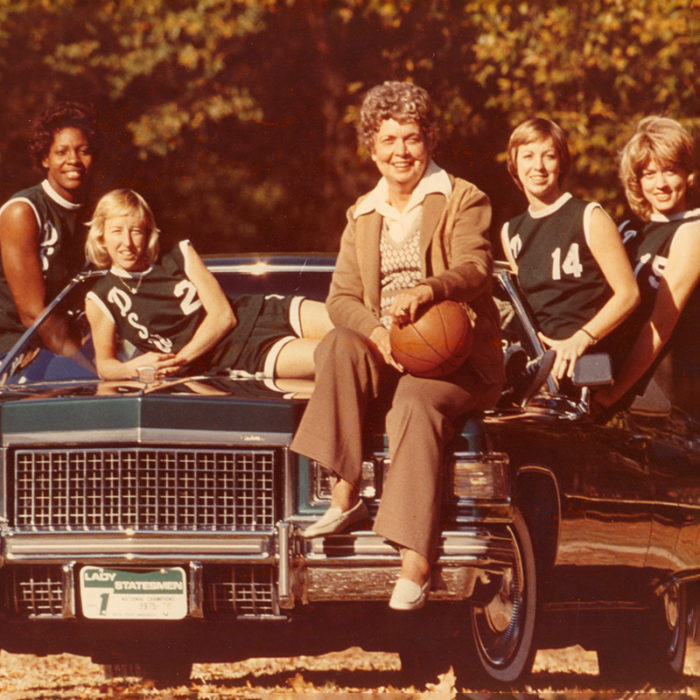Goodbye to a legend
Like the rest of the sports world, we were saddened to hear of the passing of the extraordinary Lusia Harris. We thought we’d share this excerpt from Shattering the Glass, which touches on Harris’s championship play for coach Margaret Wade at Delta State in Cleveland, Mississippi. Photo courtesy of the Women’s Basketball Hall of Fame.
One of the state’s top high school players, center Lusia Harris, competed for Amanda Elzy High, just down the road from Cleveland in Greenwood, Mississippi. Like so many great Mississippi players, Harris had grown up on a family farm, building her muscles with her chores and honing her skills in backyard contests with brothers and sisters. Amanda Elzy always fielded top teams and Harris, who stood 6’3″, was hard to miss. In the spring of 1973, she recalled, Delta State recruiter Melvin Hemphill made the drive over to Greenwood “and asked me did I want to play basketball in college.”
A decade earlier, such a question would have been unthinkable. Lusia Harris was Black, and Delta State was a white school. Throughout the 1950s and 1960s, Mississippi had mounted some of the country’s fiercest resistance to the civil rights movement. Both Cleveland and Greenwood had been the scene of demonstrations, arrests and violence, as local African Americans began to stand up for their rights. As late as 1963, when the all-white Mississippi State men’s basketball team qualified for the NCAA tournament, the staunchly segregationist governor, Ross Barnett, forbade the team to go, because participation would mean taking the court against teams that fielded black players.
By the 1970s, however, Blacks and whites across the South were cautiously testing a new racial order, and even Mississippians proved ready for some change. Although Lusia Harris had planned to attend historically Black Alcorn State, the school fielded no women’s team. Delta State’s largely white campus required “a big adjustment,” Harris noted, and the school offered no scholarships. But the lure of the game was enough. She “went on over and played a little ball at Delta State.”
The Delta State team proved a formidable mix of restraint and resolve. Like many teams of the era, they carried on the old tradition of offsetting on-court prowess with off-court charm. According to forward Wanda Hairston “we tried to go out and prove you could be an athlete and a lady at the same time.”
Wade was renowned for how much she cared about her players, and for her refined demeanor. “She was the type that never raised her voice,” Lusia Harris noted. But like many genteel southern women, Wade was tough as nails underneath. She knew what she wanted her players to do, and how to get them to do it. During games, Wade always wore a special pin under her suit jacket. “Whenever we played, she would just open that coat up, and it said, ‘Give them hell.’” Harris explained. “So, you know, she would never say that, but she would just open her coat up . . . and the pin had on it, ‘Give them hell.’ I always remember that.”
Harris brought her own contrasting traits to the team. She was a shy person, a loner who channeled her energy into playing and study. “I wanted to be able to make a living after basketball was over,” she explained. “The only thing that I concentrated on was my schoolwork and playing basketball.” On the court, however, she was an imposing figure: her 6’3″ stature was heightened by a sizeable Afro, and she had the strength to “clean folks out from under that board,” as a longtime fan noted.
“She could overpower people,” a teammate echoed, recalling that despite defenders “hanging on her arms,” Harris routinely powered up and hit her shots. Her concentration also helped her to brush off the racist comments encountered by most Black athletic pioneers. “Sometimes the fans would say, you know, things in the stands,” she recalled, “but my focus was to score that basket. . . . And sometimes it got to be pretty rough in the games, you know. . . Everybody always said that I did a lot of smiling, but I had a few to say that I was pretty physical under the boards.”
Mississippi had a top-notch high school girls’ program, and Wade surrounded Harris with a stellar cast. In the 1976 tournament, when Harris came down with the flu, and became sluggish on the court, point guard Debbie Brock stepped up. Brock stood 4’11” and weighed 80 pounds. “I carry her around in her pocket,” Margaret Wade joked. But she was a deft ballhandler as well as a crack shot. Backed by teammates Wanda Hairston, Cornelia Ward and Ramona Von Boeckman, she sparked the team to its second title, defeating Immaculata once again in the title contest.
As usual for Delta State, the five starters played the entire game. The same starting lineup would take the court for Delta State in the 1977 championship, defeating Louisiana State University for a third straight title.
Mississipians responded with enthusiasm. In 1976, a local radio station broadcast the national tournament games to three states. The night that Delta State played a cliff-hanging semifinal, one college official reported, “they took five people to the hospital with heart attacks.” After the team returned to Cleveland, students elected Lusia Harris homecoming queen. In 1977, the Lady Statesmen sold out half of their home games and made more money than the men’s basketball or football teams.
“Wherever we played, we had people from Cleveland and surrounding areas to travel to support the team,” Harris recalled. “And that meant so much. . . . A lot of other places, we had more people than the home team.” That same year, the Lady Statesmen received a police escort from northern Mississippi all the way to Minneapolis, where the national championship was held.
We were glad our work was helpful for the writer of Harris’s Washington Post obituary. To be clear, though, we did not talk to her directly. Rather, we used an oral history interview conducted with her by Georgine Clark for the Center for Oral History and Cultural Heritage at the University of Southern Mississippi. We’re grateful to the Center for Oral History and for all the other archives that capture and preserve voices for the future.
Since we wrote this, a short documentary on Harris, titled The Queen of Basketball, won an Academy Award, bringing further attention to her career and her subsequent accomplishments. It’s a beautiful piece.



